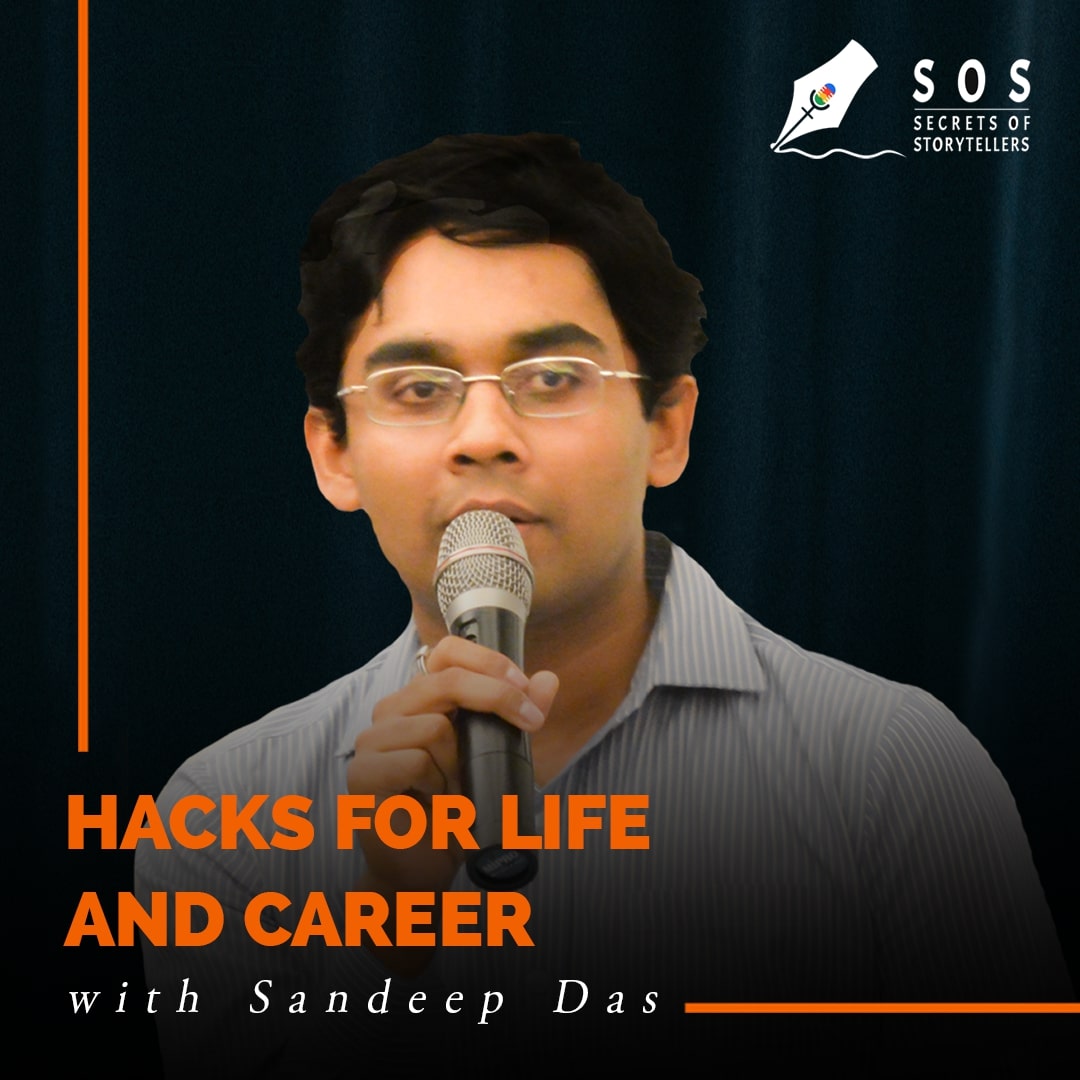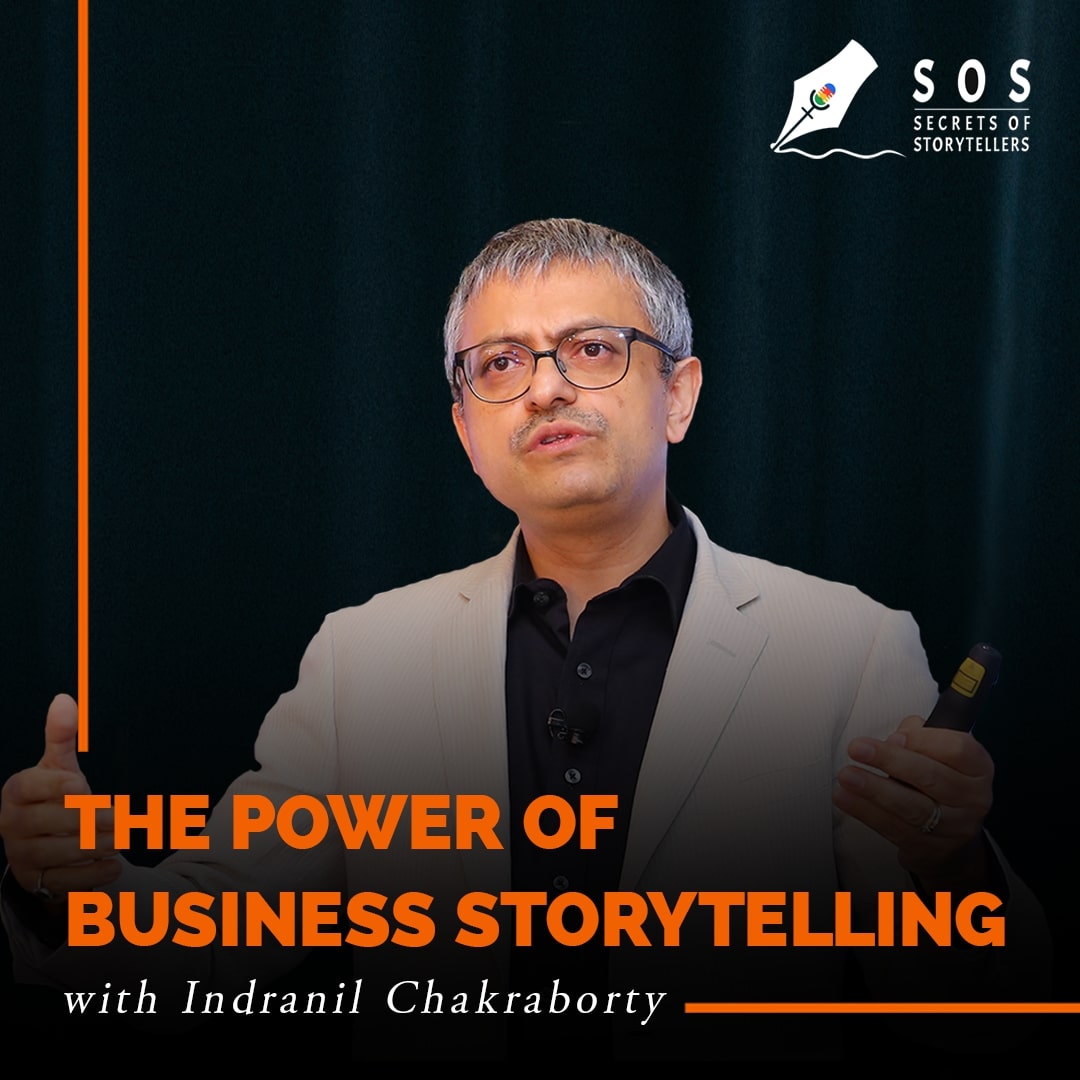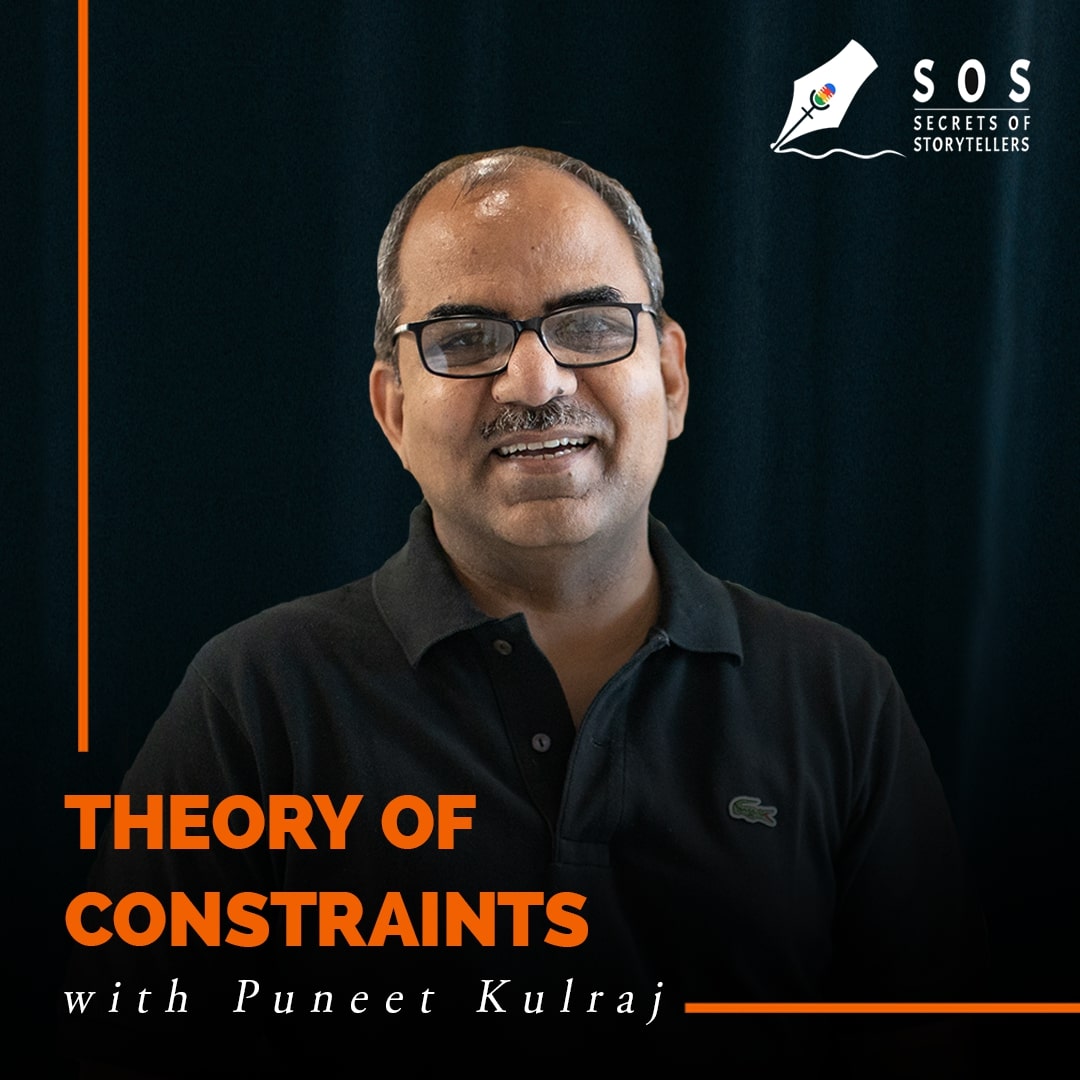Shubham(00:01) -
I often feel the need to have a mentor, a coach who could help me decide the right and the wrong, you know, especially when it comes to my professional life. Someone who could probe me ask me the right questions make me Delve upon and find the answers myself. Someone who could you know, let out a few hacks on the way while I figured out things. Do you? Do you relate to me? I feel you. Sadly, it isn't always presented on a silver platter. I think. However, our guest for today, Sandeep Das probably understood this need and wrote the book hacks for life in a career to help us make it big in life. Namaste I'm Shubham Aggarwal and you're listening to SOS, Secrets Of Storytellers, a podcast where I interview bestselling authors, we get to hear a lot of stories, concepts from the business world, and secrets about their books and their journeys. Hi, Sandeep, welcome to the secrets of storytellers. How are you?
Sandeep(00:56) -
I am good. Shubham Thank you so much. Happy Diwali to everyone who's listening. And thank you for the introduction.
Shubham(01:03) -
Right the listeners would not really hear today. But yeah, Happy Diwali in advance or in whatever hindsight. So, Sandeep, tell us about your journey as an author, how did you manage it while being one of the busiest people on the earth, Consultants?
Sandeep(01:20) -
So Shubham, I think it's a very interesting story in terms of how I started off writing. I used to be a brand manager in Marico. This was right in early 2010. And one day, my boss called me to his cabin and he said, Sandeep, your job over the next two months, is to interview 60, size zero, South Bombay women, wow, get in touch with them, take them out for dinners, get to know them, meet them multiple times, visit them at their places, and the company will fund everything. So I think it was an incredible story. It was like the universe was giving me a signal that I should write about them. And that was the genesis of my first book, Yours Sarcastically And along the way, I have been writing for 10 years in terms of how I have managed to be honest, a lot of it is luck, I have managed to consider but a few transactions in terms of what has helped is I get up early in the morning, so I get up at 4:45 every day. Wow. Okay. And I've been spending two and a half hours in the morning for the last 10 years, knowing that's one of the ways I've managed to adjust with a grueling career,
Shubham(02:33) -
What time do you sleep, then?
Sandeep(02:36) -
I sleep around 10.
Shubham(02:40) -
That's a great discipline to have. I wish I could do that. But anyway. So why, why hacks for millennials? I mean, are they not equipped enough to find their own way? Or is it to catalyze the need for quick growth, like we call it?
Sandeep(02:54) -
It's a very interesting question Shubham. And it's the genesis for my book hacks The Life and career, I have spoken to about 250-300 millennials as part of my work. And as part of my social interactions. What they used to tell me is the education system we are in, or the corporates we go to somehow doesn't equip us to succeed professionally. Someone gave me a number that 99% of what I learned in business school is useless. Now, if you ask the corporate on the other side, the corporate says 95% of the millennials and the gen z's are not professionally qualified or ready for the workplace, because of the millennials who say that the system is not treating a fair view of the corporate who says the system, the millennials are not ready for work. And hence, this book comes in the middle and tries to bridge the gap, so that millennials can succeed professionally and personally, in their life. That's the genesis of the book.
Shubham(03:49) -
Right? I see your point. I did go through a report sometime back where you know, the corporates who are the big hiring firms for fresh graduates, in particular, did complain about this fact that you know, they do not find people well equipped, or they do not have the right skills, what they need in a professional job?
Sandeep(04:10) -
Yep, yep.
Shubham(04:11) -
So if you were to draw a parallel between the people in the age group of say, 25 to 35 of today's generation, and say, people from two decades back, How would you rate them? How would you What would be your judgment on them?
Sandeep(04:25) -
It's a very interesting question Shubham. And if you see a couple of decades back, maybe some of my younger uncle's or some of our relatives, two decades back the focus was only getting a decent job in an MNC earn a salary and then life just moved on like that. It was a reflection of the Indian economy. Indian economy was just opening up sort of opening up, opportunities were limited money had just started coming in. I think if you see this generation, this generation of people like you and me who are in this age bracket, career trends are fundamentally different if you speak to millennials, and one of the findings that I saw is in this decade, most millennials, people like you are doing this life will have multiple careers and careers, which will be nonlinear. So what it means is, their traditional path to follow a career is no longer there. So someone like you might pass out of XLRI and decide to be in consulting for three years, then might decide to do this own startup for three years, then might decide to come back to e-commerce, then my say, I want to teach in a business school, just careers are very nonlinear with this generation. And people have multiple careers. And in terms of buyer values coming in this decade, it's no longer about money, money has become hygiene, you will see millennial buyer values reflect around, are they creating impact? Do they have work-life balance do they find meaning in their work? Do they feel motivated to go to work or in a set of buyer values are very different from what it was two decades ago, and hence, corporate I couldn't have not been able to adjust to this changing nature of buyer values? And that's where you see the struggle coming.
Shubham(06:02) -
I agree when you say you know the careers are not going to be linear. They are already not I think, but then there's a flip side to it. Is it that the millennials are taking quick, unplanned decisions, which is often leaving them stranded? And therefore, you know, they're moving from one place to another? Or is it because they're bombarded with a lot of noise around them, which is distracting?
Sandeep(06:21) -
That's a very tricky question, and I'll answer it in phases. One, I think millennials, these days are far braver, and far more confident in what in terms of what they want to be compared to say two decades ago, they're ready to defy societal norms, someone might just give up a 50 lakh job to do what he wants to do. This was unheard of two decades ago. So that's one second, I think there is a lot of noise that is going around. And with so much noise going around, there is a single source that is missing, which I intend my book to be. Third, I think the ecosystem is generally failing the millennials in terms of sound advice, in terms of guidance in terms of mentorship in terms of education, I think the ecosystem is also completely out of touch with what they need. And hence you will see a lot of discontent and on the ground,
Shubham(07:12) -
Right? So how does the book really help them in their careers in life, like you said, the book is to plug this gap to plug this concern that the millennials have?
Sandeep(07:22) -
Yeah, so in terms of, it's interesting to see the number of sections The book has, and each section serves a particular purpose. A book starts with technology, you know, there's a lot of talk about technology, you hear about people losing their jobs, you know, you hear about AI and AI, you know, they simply view in terms of what technology is going to be over the next five years of man and machine will work together, which other set of tools, the millennials need to master that that's the first section. The second section is, and you come from Business School, you would have over two years, you would have studied 400 textbooks and so many chapters, but what I've actually said is there are only 20 concepts you need to know, on a day to day basis to really succeed. And I take those 20 concepts, give actual practical examples, and say that this is how you approach these 20 concepts in real life practical examples that should take care of your 80% of day to day transactions from a knowledge point of view. The third section covers is in terms of entrepreneurship, a lot of us at some point, you are already an entrepreneur in a way you will pursue entrepreneurship. And section looks at in terms of how do you actually build a great company? What are the mistakes people make? What are some of the best practices you should have? And how do you actually just start off building a great company in very simple English. The fourth section, in my view is the most important and the single biggest deficiency in the Indian education system is the lack of knowledge of personal finance. Because in terms of millennials need to know what to do with money, a lot of them own a lot, but they don't know how to save how to grow it. So where do you invest? What's the good portfolio allocation? How do you grow that money, because the more money you have in the bank, the better you'll sleep, the more risk you will take. So that's the fourth section on personal finance. The next section that you will see is in terms of I've taken about 20 very good cutting you read across the world and said that every millennial needs to know these water cooler trends, that I the history of the financial crisis over the last 100 years whether How does design thinking work on a day to day basis. There is old talk of rural India and how rural India is going to drive demand. So how does rural really work around these 20 cutting edge topics which every millennial needs to know. Then we have sections in terms of every millennial will work in one of these industries, whether it's consulting like you, whether it's fmcg, whether it's IT consulting, whether it's banking, investment banking, and I take each of these industries and give a view of the industries and how will the industry grow? What are the key trends? How do you make a career? What sort of packages can you expect? What are the pros and cons? That's a whole section in terms of industries, then there are other sections in terms of I look at the personal life better, how do you maintain good mental health? What are some of the 10 things you should do on a day to day basis to maintain sound mental health? Or what are the books you should read? How do you pursue an alternate career? Whether it's writing, whether it's speaking like you, whether it's art, how do you build that whole personal life to yourself? So these are some of the sections that have been there. The book has about 60 chapters, and each chapter plugs in a specific gap, so that it helps the millennial
Shubham(10:30) -
Interesting, Sandeep I'm curious, so you said there are about 20 concepts that you think should govern your your professional life, your personal life and things like that? Could you touch upon a few of them? If you if you're comfortable?
Sandeep(10:43) -
Yeah, absolutely. So in terms of I'll give you one example, how do you do pricing on a daily basis? So if you're a brand manager, or if you're in sales, or your e commerce, one of the most important decisions you will do is how do you got pricing strategy in the real world? And I take an example, an actual example and say, This is how you do pricing is looking at competition benchmark, whether it's looking at elasticity, how do you do pricing in the real world, not just the textbook basis, and that is something I touch, for example, the other thing I touched on is in terms of how to use behavioral psychology in day to day transactions, all of us will be dealing with vendors, all of us will be dealing with bosses, all of us will be dealing with clients. And a lot of this human behavior is governed by behavioral psychology. So I gave like seven eight examples in terms of what are the instances you will have in a day to day basis? And how do you use an anchoring effect? How do you use the various behavioral psychology principles to succeed in each of these transaction, then I touch upon basics of finance, which people are supposed to know I, what I've seen over my interactions is there's a lot of corporate finance, people are taught that some of the basics are never taught to well. So in terms of how do you understand enterprise value? How do you understand a P&L? In Simple English? How do you understand working capital, because if you are an fmcg, and if you're going to talk to a distributor, he only understands working capital and rotation. So those simple day to day practical concepts are taught very, very well in the book.
Shubham(12:08) -
Great. And where do these learnings come from? So are these your personal tries with learning? Or is it that you these are handed down to you? How did it take shape?
Sandeep(12:19) -
That's a good question. There are multiple sources. One is obviously I've gone with my own experience. And I've seen the gaps that were there in my skill set. And over a period of time where I struggled. So that's one source. The second source is I spoke about 250 300 millennials, and got to a certain viewpoint from them. So I remember one millennial came and told me, I don't understand how the stock market works. Can you explain in Simple English, how does the BSE actually work? When BSE is 43,000? What does it 43,000 means? So some of those inputs came from that. And some of the input came from the corporate. I also have the corporate job. I spoke to a lot of my friends in the corporates and they said, This is where we see them lacking I spoke to a few CHROs and said, You don't we don't know. We don't think they know how to handle an emotionally at work. So it's a multiple sources of this, which I curated together under one roof and packaged it that that's the genesis of all these points.
Shubham(13:13) -
Wonderful, wonderful. What would you suggest to younger, energetic fellow who wants to make it big in life?
Sandeep(13:20) -
You should read my book. Simple.
Shubham(13:24) -
Perfect. Great. That's great. All right. So let's move on to the rapid-fire section. A new to our podcast. And we keep juggling with it. Keep trying if it works or not for us has been doing good till now. So I think you you would know the rules. Yeah. All right. What is one trade that you think has helped you achieve the success that you have in life today?
Sandeep(13:45) -
I think consistency, I think I have been at it every day for 10 years getting up at 5am. And putting in two, two and a half hours every morning. Following that process. In my mind, I think that consistency, whatever limited I have achieved in life, I will attribute to it. What else?
Shubham(14:05) -
Great and what was the motivation behind that consistency? I mean, were there times where you were, you know, you want to lacs out or you had other things on mind and you wanted to not not wake up at 5am? Say, how did you kept coming back to it? or How did you kept at it?
Sandeep(14:19) -
I think it's a good question. This is something I've always enjoyed for all practical purposes of corporate jobs, all of us are miserable. And all of us are looking for an outlet outside are miserable jobs. And this was a necessary outlet which gave me joy over a period of time, some recognition, visibility and adding it from that feeling of joy that you manage to keep at it because if I if I was not happy doing it, I think I'm sure I would have lapsed out in a couple of years. Yeah. Great.
Shubham(14:50) -
So what's your most cherished book after you're in books, obviously.
Sandeep(14:56) -
So I think a book which I always enjoy reading was Shantaram Oh Wow. I'm sure you have readi it. It was a beautiful book It spoke about Bombay. And that's how I fell in love with the city it during my college days, and it was a travelogue. It was a great story was fantastic writing Shantaram is a book that I hold very close to my heart
Shubham(15:18) -
Ohh wonderful great that that is indeed a beautiful book, no doubt about it. Yeah, yeah. Okay, what's what's the motto you live by in your life?
Sandeep(15:27) -
I think the motto I have lived by is someone I look up to very highly, Ms Dhoni. And I've always followed some of the words they have said very carefully. So follow the process. And I follow the input metric in terms of what is in my control. And I don't get hassled too much about the output. So what I can do what I have to do i do daily, and over a period of time, hopefully things will work out i think i think that's the motto I follow do something MSD is use to follow a lot during a speech. That's that's motto i follow. it's difficult to do. But I think over a period of time you get used to it.
Shubham(16:04) -
Right? I was saying I think the podcast was about your book, but it caught about you and your personal life, I guess. So we're going to go even more deeper and ask you a very personal question next, because this is something which is common across all the episodes. So as you know, we call the show secrets of storytellers, I want to ask you one secret about the book, or about your your authoring journey, which you've probably never shared or not really spoken about.
Sandeep(16:34) -
That's a difficult one. But that's the idea of this question. I think the one thing which I've always tried, and maybe it's a tip for other budding authors, is, when I write a book, I always have in mind how it can be adapted everywhere. So when I wrote hat, I always had in mind that somewhere, someday, maybe it would become a web series. Or someday it would become a business school textbook, or someday it would become a 10 year franchise, or someday could become a global edition. So when I when I conceived hat, it was not just a book, I had a complete ecosystem, conceptualized around the book. And I think even when I wrote my first one, and my first one is now being considered for a movie adaptation, but I was very clear that someday this book should become a movie. And I think all budding authors should look at their pieces of work, and how they should dream big and ensure every medium it can get it up to two, that's when they should start writing.
Shubham(17:34) -
Interesting. So keep manifesting while you're writing the book, or whatever you're doing.
Sandeep(17:39) -
Yeah, obviously. Yeah. Push it to as many mediums of communication.
Shubham(17:47) -
Right, Right. Sandeep are you working on any any book at the moment, which you can probably share with us
Sandeep(17:54) -
NO, No my book just got released a week back. So I think I need six months of break, to be honest, to get over the hassles of writing. But I definitely have a few in the pipeline. And I actually, my first book your sarcastically might be considered for a movie adaptation. So to write the script for that, That's next on the cards. And then let's see what happens. Like goes up to maybe six months later, I'll have a chat with you again.
Shubham(18:19) -
So I would be happy to do that. Great. Thank you so much, Sandeep for your time. It was a lovely session. We really enjoyed it. And I hope you did as well.
Sandeep(18:30) -
Yeah, thank you. Thank you Shubham for the opportunity. And I think you guys are doing a great job. Please keep doing this that really helped authors like us
Shubham(18:37) -
Thank you so much. That really means a lot. And thank you to all the listeners. This is Shubham signing off, until the next secret and the next storyteller.










